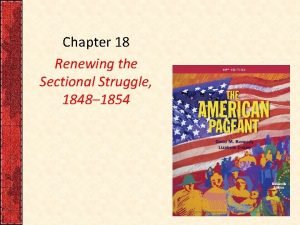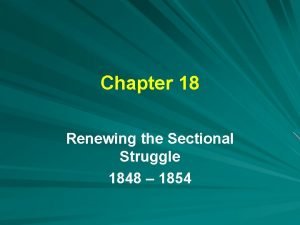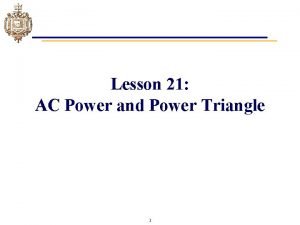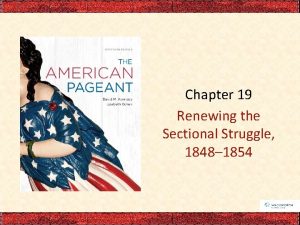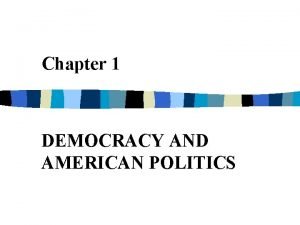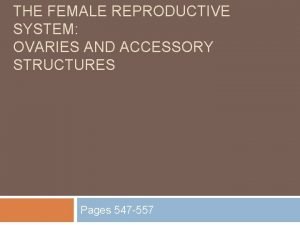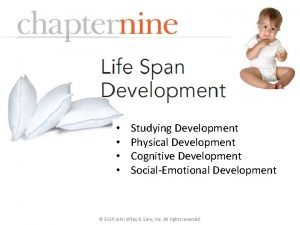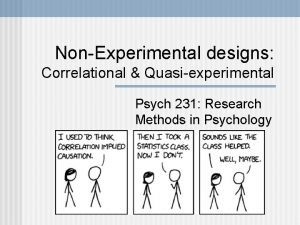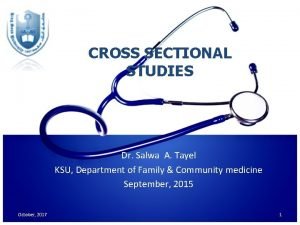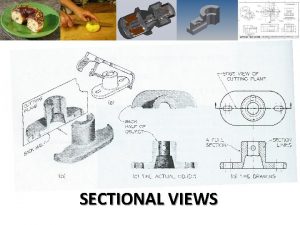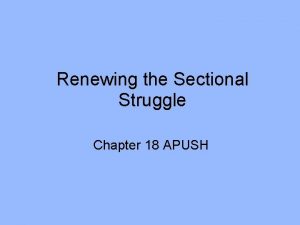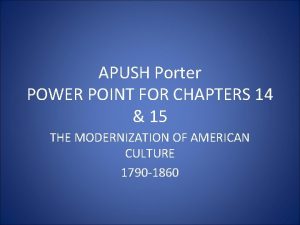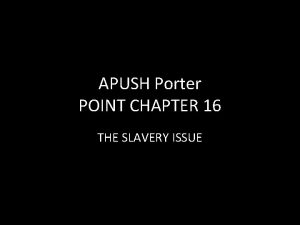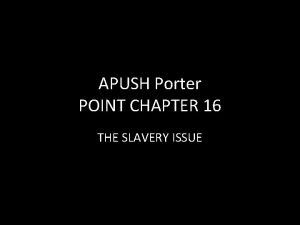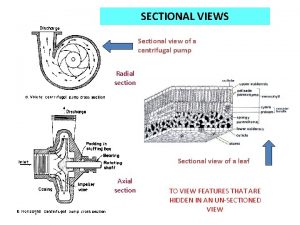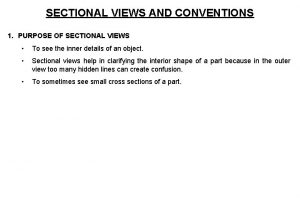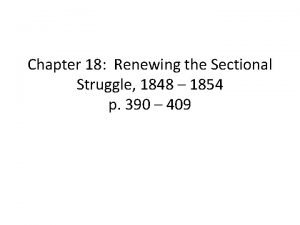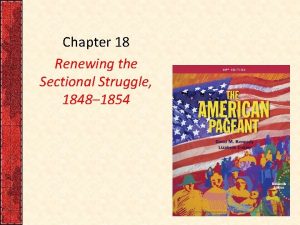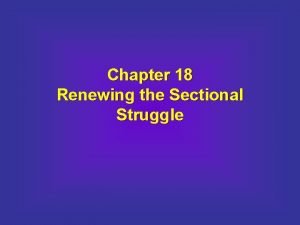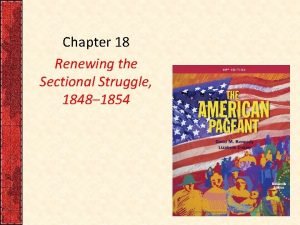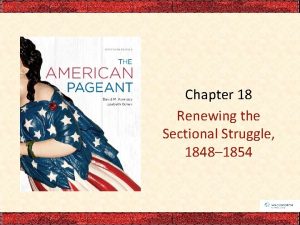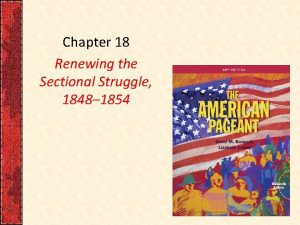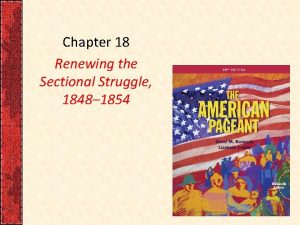APUSH Porter CHAPTER 18 POWER POINT SECTIONAL STRUGGLE

































- Slides: 33

APUSH Porter CHAPTER 18 POWER POINT SECTIONAL STRUGGLE 1848 -1854

KEYS TO THE CHAPTER • • Popular Sovereignty Free Soil Party California Compromise of 1850 Gadsden Purchase of 1853 Kansas-Nebraska Act Presidents: Taylor; Fillmore; Pierce Clayton-Bulwer Treaty

• MEXICAN-AMERICAN WAR MADE SLAVERY & NEW TERRITORY THE MAIN ISSUE • Both national parties important for national unity – If they were replaced by 2 sectional parties (with support only in North or South), Union would be in danger – Politicians believed safest course was to ignore problems generated by slavery – Northern abolitionists and southern “fire-eaters” (strongly pro-slavery) continued to agitate

Popular Sovereignty – People of each territory should choose whether to have slavery or not – People liked it because it fit with democratic tradition in US – Politicians liked it as compromise between Free-Soilers (wanting to ban slavery in territories) and South that wanted protection for slavery in territories – Problem: it might allow for the spread of slavery

THREE POLITICAL PARTIES FIGHT IN ELECTION OF 1848 • Free Soil was first sectional party – “free soil, free speech, free labor, free men” – South did not support Free Soil at all – Main support came from North (and somewhat from West) nominate Van Buren Democratic Party nominates Cass (Polk too exhausted to run) Whigs nominate the hero of the War, Zachary Taylor (“old rough and ready”)


CALIFORNIA • Early 1848 – gold discovered northern California at Sutter’s Mill – Huge numbers of lawless men poured into California • A few got rich; most lots of money • Most profits made by providing services to miners (laundry, food, etc. )

• • • 1848 gold discovered 1849 “the 49 rs come-gold rush” 1850 California will become a state • Government in California overwhelmed – Outburst of crime (murder, robbery, claim jumping) • Californians wanted government to combat lawlessness – 1849 – California applied for admission to US • • • State Constitution written that outlawed slavery California would bypass usual territorial stage Strongly opposed by South

Sectional Balance – 15 slave, 15 free states in US – Admitting California would upset balance in Senate – South feared that California was just the start • Utah and New Mexico both wanted admittance as free states SOUTH SEEKING TO SOLVE THE RUNAWAY SLAVE PROBLEM

• South demanded stricter fugitive-slave law – First one (passed in 1793) was inadequate and ignored by antislavery public officials – Only about 1, 000 slaves per year escaped • More purchased their freedom than escaped • South angered that abolitionists were able to ignore law • Harriet Tubman seen as the “great conductor” on the underground railroad

• Crisis in 1850 over California and slavery – “fire-eaters” in South talked of secession – Meeting called in Nashville to discuss Southern secession • Congress had to act to keep Union together – 3 great leaders of older generation (Henry Clay, John C. Calhoun, Daniel Webster) worked for compromise • Henry Clay – “Great Compromiser” urged compromises by North and South – Supported by Senator Stephen A. Douglas (Illinois)

• John C. Calhoun – Defended the South in speech a colleague delivered (because of Calhoun’s poor health) – Supported compromise, but did not think Clay’s proposals were enough to protect South – Wanted slavery and South left alone and political balance between North and South – Died in 1850, before debate was over

• Daniel Webster – Supported Clay’s compromises, including stronger fugitive-slave law – Argued legislation on slavery in territories unnecessary • Climate, geography, topography in Mexican Cession made slavery unworkable there – Powerful March 7, 1850 speech turned North to compromise • Supported by banking and $ sectors of economy that would lose millions if secession occurred • Attacked by Free-Soilers and abolitionists as traitor to Northern (antislavery) cause

• William H. Seward – – New Senator from New York Became spokesman for northern antislavery radicals Opposed compromise with South Called for obedience to “higher law” regarding slavery in the territories • 1850 – anti-compromise President Taylor dies – Millard Fillmore takes over; willing to compromise – Taylor would have vetoed compromise; Fillmore signs it

• North thought it got more from Compromise of 1850 – California admitted as free state • Balance of power in Senate favored North from then on – New Mexico and Utah based on popular sovereignty • Very unlikely either area would vote for slavery – $10 million paid to Texas for disputed territory – Sale of slaves in D. C. banned, but not slavery itself – Fugitive Slave Law of 1850 • South gained tougher law, but Northern opinion against slavery would harden as a

The Compromise of 1850

Compromise of 1850 won Civil War for the North – Delay gave the North more money, population, factories, crops, etc. to fight war with – Delay gave North increased moral strength • In 1850, most Northerners would not have supported use of force to keep South in Union • By 1860, most Northerners would support use of force against South

• Election of 1852 – Democrats – Nominated unknown Franklin Pierce • Had served in Mexican War • Was pro-South northerner, making him acceptable to Southern Democrats • Election of 1852 – Whigs – Chose a war hero, General Winfield Scott (from Mexican War)

• Results of election of 1852 – Scott lost because of division in Whig party – Scott also hurt by Free Soil Party that took votes from him Election would mark the end of the Whig Party: -It had kept country together because it drew votes from both sections but now that was over


Expansionist Stirrings South of the Border • Central America – British involvement in Central America (including seizure of a port in Nicaragua) aroused American concern – 1848 treaty between US and New Granada (Columbia) • Gave US right to travel across the area; US would maintain neutrality of area, so traffic could go freely • 1855 – first railroad across Panama completed – 1850 – Clayton-Bulwer Treaty • US avoided conflict with Britain • Neither Britain or US would fortify or seek exclusive control over any future waterway across isthmus (future of Panama Canal

Central America, c. 1850, Showing British Possessions and Proposed Canal

• Nicaragua – 1856 – William Walker took control; declared himself dictator and legalized slavery but is overthrown by other C. A. countries CUBA – Polk had offered $100 million to Spain, but was turned down – Attempts made to seize it but Northern politicians oppose South’s attempt to gain additional slave lands

The Allure of Asia 1842 – Britain beat China in Opium War – Gained right to export opium to China and access to 5 ports and control of Hong Kong • 1844 – Caleb Cushing gets treaty expanding trade between China and America • 1853 – Warships led by Commodore Matthew C. Perry to Japan -opening of Japan led its leaders to drive for modernization

The Gadsden Purchase • Fight between North and South route for transcontinental railroad – California Gold made quicker travel West a necessity – Too expensive for two routes – 1853 – treaty negotiated by James Gadsden • US paid $10 million for the area left over from Mexican War • North says a waste of $ on desert wasteland • Treaty approved by Senate

Gadsden Purchase 1853

Douglas’s Kansas-Nebraska Scheme • Senator Stephen A. Douglas (Illinois) wants R. R. through Chicago, where he had invested heavily – Needs to counter Gadsden Purchase – Needs to get Southerners’ support • North replied that US should organize Nebraska territory and run train route there – Many settlers already there – Opposed by most Southerners

• Douglas’ plan (Kansas-Nebraska Act) – Nebraska Territory cut into 2 areas; both would allow (or not) slavery based on popular sovereignty • Kansas Territory would probably allow slavery • Nebraska Territory would probably not allow slavery – Required repeal of Missouri Compromise (since both Kansas and Nebraska were north of 36° 30’ line) • The South’s reaction – Saw chance to gain another slave state – President Pierce (influenced by South) fully supported Kansas-Nebraska Act

• Kansas-Nebraska Act passed after violent arguments and speeches in Congress – Passed with strong support from the South – Hated by the North which saw chance of slavery being allowed where it was previously outlawed DOUGLAS DID NOT CARE SO MUCH ABOUT SLAVERY EITHER WAY BUT HAD STRONG FINANCIAL INTEREST AND SAW ACT AS HELPING IN FUTURE PRESIDENTIAL RACE

The Kansas-Nebraska Act (1854)

• Douglas’ miscalculation – Had predicted controversy, but nothing close to what actually happened – Many northerners felt strongly about slavery and did not want it to expand under any circumstances • North turned against Douglas as a traitor, although he was still popular in Democratic party (especially in Illinois)

• Kansas-Nebraska Act led directly to Civil War – Missouri Compromise specifically repealed to allow slavery north of 36° 30’ line – Compromise of 1850 unofficially repealed as northern opinion turned against South • North refused to enforce Fugitive Slave Law after 1854 (many states pass liberty laws) – Without compromise, conflict was unavoidable – North gained many new converts to abolitionism – South angered when North tried to block slavery in Kansas (against “deal” of Kansas. Nebraska Act)

• Kansas-Nebraska Act’s political effects: – Democratic party shattered • Elected Buchanan in 1856, and then did not win White House for 28 years – Republican Party created • Began in Middle West as protest against slavery • Gained strength from opponents of Kansas. Nebraska Act – Former Whigs, Democrats, Free-Soilers, Know-Nothings • Quickly spread east as a sectional party
 Chapter 18 renewing the sectional struggle
Chapter 18 renewing the sectional struggle Chapter 18 renewing the sectional struggle
Chapter 18 renewing the sectional struggle Power triangle diagram
Power triangle diagram Power bi power point
Power bi power point Point point power
Point point power Struggle chapter 19
Struggle chapter 19 Struggle chapter 3
Struggle chapter 3 Struggle chapter 1
Struggle chapter 1 Cross section of cuboid
Cross section of cuboid Sectional air map made of plastic
Sectional air map made of plastic Accessory structures of female reproductive system
Accessory structures of female reproductive system Sectional views reveal
Sectional views reveal Anxious ambivalent attachment
Anxious ambivalent attachment Cross sectional research design example
Cross sectional research design example To find the true shape of the section
To find the true shape of the section Views
Views What line types are usually omitted from sectional views
What line types are usually omitted from sectional views Offset section in engineering drawing
Offset section in engineering drawing Cross section view
Cross section view Full section
Full section Advantages of a cross sectional study
Advantages of a cross sectional study Categories of research design
Categories of research design Cross-sectional correlational design
Cross-sectional correlational design Sectional steel water tanks
Sectional steel water tanks Cross sectional study
Cross sectional study Cross-sectional plane
Cross-sectional plane Conclusive research
Conclusive research Quasi experimental
Quasi experimental What is quasi experimental research
What is quasi experimental research Cross sectional study
Cross sectional study Offset sectioning
Offset sectioning Operational thought
Operational thought Cross sectional research design
Cross sectional research design Cross sectional vs longitudinal
Cross sectional vs longitudinal
